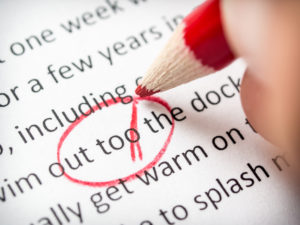
COMMON WRITING MISTAKES: A SERIES
In part one of our three-part Common Writing Mistakes series, we looked at three of the top rookie mistakes made by first-time novelists (lack of conflict, imbalance in dialogue vs. action and info-dumps masquerading as dialogue). In part two, we looked at more rookie mistakes (telling instead of showing, head-hopping, unsympathetic characters and using your voice for your characters).
Today in Part 3 we’ll look at three final fiction-writing mistakes made by first-time authors. Yes, I’ve committed a lot of these errors, too — and plenty more!
Please comment below with your own favorites and your solutions.
Keep it clean
8No, this has nothing to do with that raunchy scene you’re planning between those two will-they-won’t-they characters. I mean, keep the typescript clean. Use plain English. That applies to spelling, punctuation and grammar as well as your sentence structure.

This is more of a surface detail than a deep-dive into the craft of novel-writing, but it matters. Here are three reasons why.
One, readers notice these things. Do it once or twice and most will be forgiving. Do it repeatedly and you’ll see their ire turning up in online reviews. These can range from the relatively benign, “Could have done with a good proof-reader,” to the downright hostile, “Riddled with such basic errors of grammar I started to wonder if it was written by a schoolkid who failed English.”
Two, it’s a smudge on the glass. I often describe writing as being like a window onto another world. When the window is clean, the reader sees only the view. When it’s smudged spotted or smeary, they notice the window, not the view.
Every error of spelling, punctuation, grammar or even elementary style that your reader notices drags their focus away from your story and onto your writing. They forget they’re experiencing another life and realize they are consuming a (badly produced) product. This is fatal to reader engagement, reviews and your commercial success.
Three, it hampers your efforts to tell the story you want to tell. Another way of looking at errors is to see them as ambiguities. If you are not precise in your use of language, then your meaning is equally fuzzy. Such apparently trivial issues as the placing of a comma, colon or hyphen can radically affect meaning. Here are two examples.
Woman without her man is nothing.
You might mean either:
Woman, without her man, is nothing.
Or
Woman: without her, man is nothing.
And how about this one?
“As a married man and a vicar, I am all in favor of extra marital sex,” said the Reverend Smith.
That’s perfectly fine, if a little TMI. But maybe he actually said this:
“As a married man and a vicar, I am all in favour of extramarital sex,” said the Reverend Smith.
Which is shocking and waaay out of character.
Incidentally, I am not arguing that you personally should be responsible for this. Although it helps. Being a good storyteller does not mean being a good copy editor or proof reader. In fact, there’s a whole industry of publishing professionals who supply the latter services. That means dyslexia is no barrier to success as an author. Not turning out a professional product, on the other hand, is.
Using coincidence to solve plot problems
9If you have a moment, read “Pixar’s 22 rules of storytelling.” Rule 19 is one of the best, though they’re all brilliant.
“Coincidences to get characters into trouble are great; coincidences to get them out of it are cheating.”
I take this to mean that you can have an unlikely situation at the beginning of your novel to set the ball rolling. A lot of the Jack Reacher books kick off this way. The reader is in a forgiving mood because weird stuff happens every day, right? And anyway, what they’re really thinking is, “What happens next?”
But you can’t hand victory to your hero by what in the theater is called a deus ex machina, literally, God from the machine. It means that having run out of ideas, the dramatist has a God descend from heaven, or Asgard or Olympus, and sort things out with a wave of their wand/thunderbolt/axe/insert favorite Godly tool here.

In my work in progress, a woman walking her dog finds a dead body (or parts thereof) down a badger sett. It’s a pretty big coincidence, but it doesn’t matter because at this stage, nothing’s at stake. But the hero, a detective inspector, must solve the crime using his knowledge, skills and intuition. I won’t have a TV in a bar suddenly play footage of the perpetrator on CCTV. Or have the murder weapon turn up inside an abandoned car.
Not knowing how to begin, or end, your story
10If you’ve suffered from writer’s block in your career, I suspect the onset occurred at page one. Not page 129.
Most of us are pretty good at writing the middles of our novels, when characters are established, conflicts at least partially explored and goals glimpsed. It’s the beginnings that give us the heebie-jeebies. (And the endings, of which more shortly.)
I like to get round the problem by jumping in media res. Which is a fancy-schmancy Latin phrase that means “into the middle of things.” Here’s the opening of my novel First Casualty.
GABRIEL Wolfe looked down at the bloody bullet wound in his right thigh.
“Britta! I’m hit!” he shouted.
Britta Falskog whirled round, still firing her SA80 assault rifle in five-round bursts over the top of the fallen tree she was using for cover.
“I’m coming. Can you move?”
“Not sure. Hurts like fuck.”
I fill in the details over the next couple of chapters. Who they are. How they got there. Where “there” is. And who’s shooting at them. But as an opening, I think it might be my best.
Using in media res is one way of doing it. There are others, of course. You might follow your protagonist from the moment they wake up. Or start with a description of a creepy house. Or a romantic forest glade. Or an undiscovered trout stream.
Just make sure you give your reader some reason to keep reading. Fine writing about sparkling water, algae-stained drainpipes or sun-dappled leaf mould will only take you so far. You need to introduce two things, I would suggest. First, a character. And second, a hint, if not a full depiction, of the central conflict.
How about at the other end of your novel? I have a couple of author friends who have spoken publicly about their difficulties with endings. The main action is done. You’ve staged the dramatic climax. But …
… you just can’t seem to find that perfect final scene that will send your reader off to sleep with a smile on their face. Or perhaps a feeling of empathy for the lead character. Or a blood-curdling, Surround-Sound, Smell-o-Vision nightmare.
My editor at Thomas & Mercer, Jack Butler, put it to me this way: “The book ends once the main character has got what they’ve been trying to get.” In the book we were discussing, the villain had confessed after some skilful interviewing by the hero. I then wrote a fairly lengthy courtroom scene that concluded with the judge passing sentence.
Jack’s verdict was simple: “It’s not a courtroom drama. The bad guy’s been arrested and charged. Job done.”
So I ended with a brief scene as the assorted cops, CSIs and police staff gather in the pub to celebrate. Jack calls it the “off ramp” I call it the “post-coital cigarette.” (Let’s use Jack’s term.) It’s a chance for the reader to reflect on the story and gather their things together before leaving the fictional world you’ve created for them.
One last thing …
Remember, everyone was a rookie once. That means your favorite author has made all these mistakes, and plenty of others. And one more last thing.
When you look at a book you love or admire, and compare it despairingly with your own work in progress, remember that the book in your hands has been through a raft of editors, fact-checkers and proofreaders. It’s a finished product. Yours isn’t. It’s a work in progress. I hope this series helps you make progress, too.
First-time author mistakes 1-3 here: Top rookie mistakes made by first-time novelists (and how to avoid them)
First-time author mistakes 4-7 here: More rookie mistakes made by first-time novelists
Want help in spotting writing mistakes?
For help in stamping out all these beginning author writing mistakes, check out Marlowe, the fiction-savvy artificial intelligence from Authors A.I.







Andy Maslen offers a good balance of insight, guidance and encouragement. He’s easy to follow and there’s always a reward at the end.